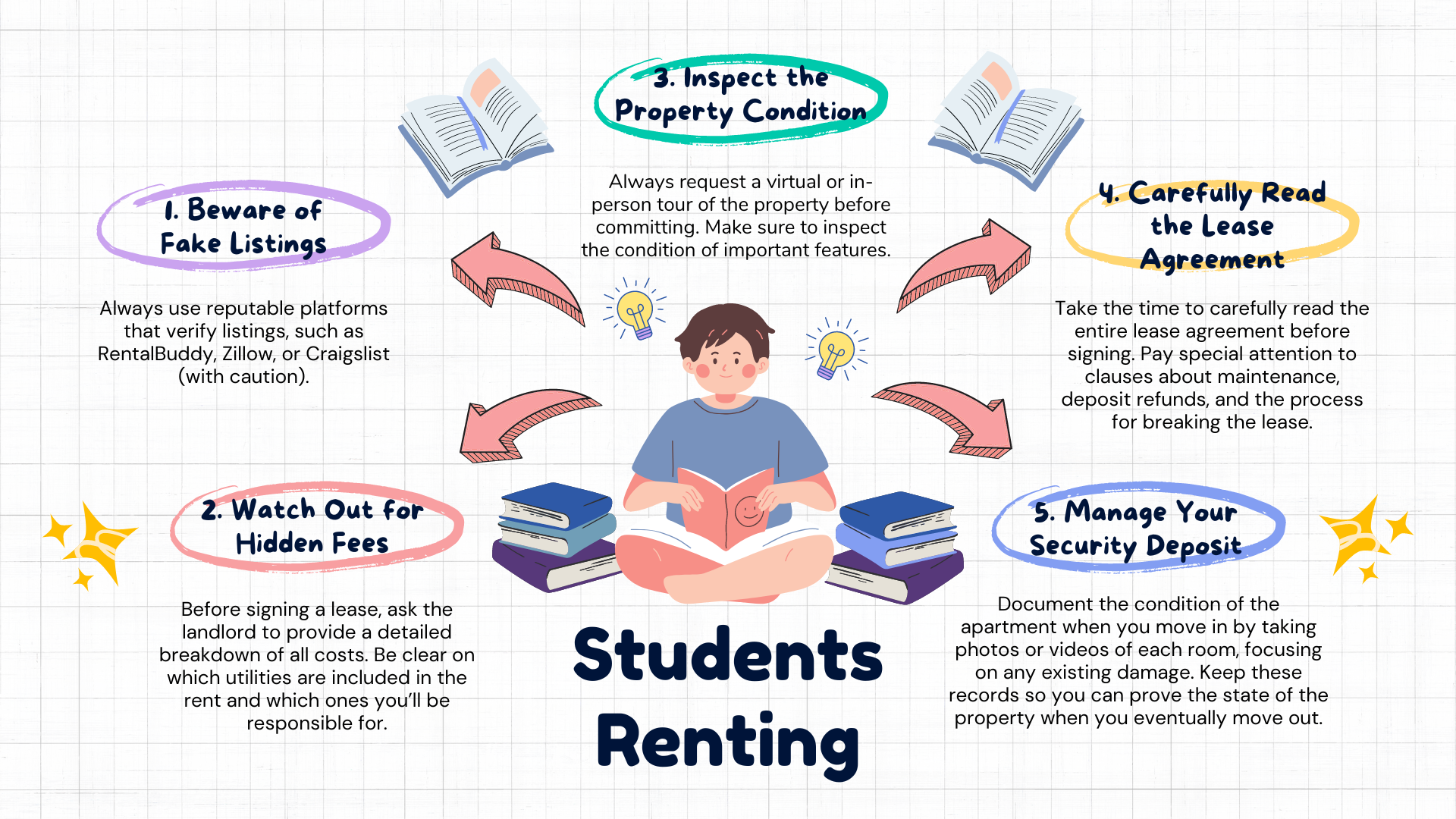· tutorial · 5 min read
A Guide for International Students Renting in the U.S.
Essential Tips for Students Renting: Avoid Common Pitfalls and Secure Safe, Affordable Housing

Renting a place to live is one of the most important steps for international students studying in the U.S. However, navigating the rental market can be daunting, especially when you’re unfamiliar with local customs, legal requirements, or hidden costs. In this guide, we’ll walk you through the most common challenges and pitfalls international students face when renting in the U.S. and provide tips to help you secure safe and affordable housing with confidence.
1. Beware of Fake Listings
The first major challenge international students face when renting in the U.S. is the risk of falling for fake listings. Scammers often target students who are searching for housing remotely, posting fake ads with attractive prices and asking for deposits before you’ve even seen the place.
Solution:
To avoid being scammed, always use reputable platforms that verify listings, such as RentalBuddy, Zillow, or Craigslist (with caution). If possible, visit the property in person or arrange a video tour. Verify the listing by cross-referencing with multiple platforms or asking for additional details and documentation from the landlord.
2. Watch Out for Hidden Fees
Renting in the U.S. can come with extra costs beyond just your monthly rent. Utility bills, maintenance fees, parking costs, and renter’s insurance are all potential expenses that might not be included in the advertised price. Without proper clarification, these hidden fees can add up quickly and create financial stress.
Solution:
Before signing a lease, ask the landlord to provide a detailed breakdown of all costs. Be clear on which utilities are included in the rent and which ones you’ll be responsible for. This will help you budget more effectively and avoid surprises later on.
3. Inspect the Property Condition
The condition of the property is another critical factor when renting. For international students renting from abroad, it’s challenging to assess the quality of the apartment or house remotely. Defects such as broken appliances, faulty plumbing, or outdated heating systems can turn your stay into a nightmare.
Solution:
Always request a virtual or in-person tour of the property before committing. Make sure to inspect the condition of important features like kitchen appliances, bathrooms, and furniture if the property is furnished. If repairs are needed, ask the landlord to fix them before you move in.
4. Carefully Read the Lease Agreement
The lease agreement is a legally binding document that outlines your rights and responsibilities as a tenant. For international students, understanding complex legal language can be difficult. Misunderstanding key terms, such as early termination policies or deposit conditions, could result in unexpected costs or losing your deposit.
Solution:
Take the time to carefully read the entire lease agreement before signing. Pay special attention to clauses about maintenance, deposit refunds, and the process for breaking the lease. If you’re unsure about any terms, ask for clarification or seek advice from a legal professional or a student housing office at your university.
5. Manage Your Security Deposit
In the U.S., most landlords require a security deposit, typically equal to one or two months’ rent. This deposit is refundable at the end of your lease, provided there’s no damage to the property. However, disputes over security deposits are common, especially when there’s no clear record of the property’s condition before you moved in.
Solution:
Document the condition of the apartment when you move in by taking photos or videos of each room, focusing on any existing damage. Keep these records so you can prove the state of the property when you eventually move out. Make sure the lease outlines the conditions under which your deposit will be refunded.
6. Understand Broker Fees
In some cities, you may need to work with a real estate broker or agent to find an apartment. While they can help you navigate the rental process, brokers often charge fees for their services. These fees can be substantial, typically ranging from one month’s rent to 15% of the annual rent.
Solution:
Ask upfront about any broker fees. In some cities like New York, it’s common for renters to pay these fees, but in other locations, the landlord may cover them. Make sure you fully understand any fees before committing to using a broker’s services.
7. Evaluate the Neighborhood
The location of your rental is just as important as the property itself. As an international student, you want to live in a safe, convenient area with good access to public transportation, grocery stores, and other essential services. However, it can be difficult to gauge the quality of a neighborhood from afar.
Solution:
Research the neighborhood by reading online reviews and checking crime statistics. Use tools like Google Maps to assess the proximity of public transport, schools, shops, and other amenities. Some platforms also provide neighborhood insights, giving you a better understanding of the area’s safety and livability.
Conclusion
Renting in the U.S. as an international student comes with unique challenges, but by staying informed and taking the right precautions, you can avoid common pitfalls and secure a comfortable and affordable living arrangement. Whether you’re looking for housing near your university or exploring co-living spaces, being proactive about things like hidden fees, lease agreements, and neighborhood safety can make all the difference.
References:
- U.S. Department of Housing and Urban Development. (2023). Tenant Rights and Responsibilities
- Internations Organization. (2022). Renting and Housing in the US: Everything You Need
- Amber Student (2023). The Ultimate Guide for International Student Housing
